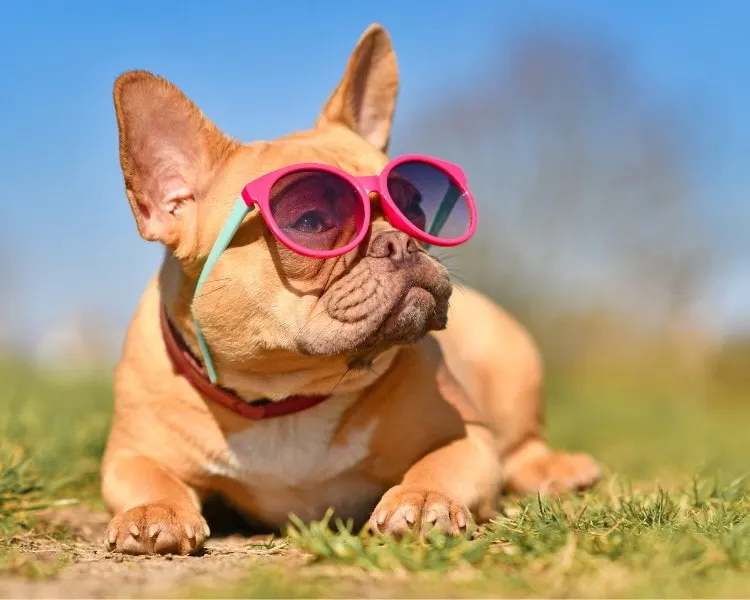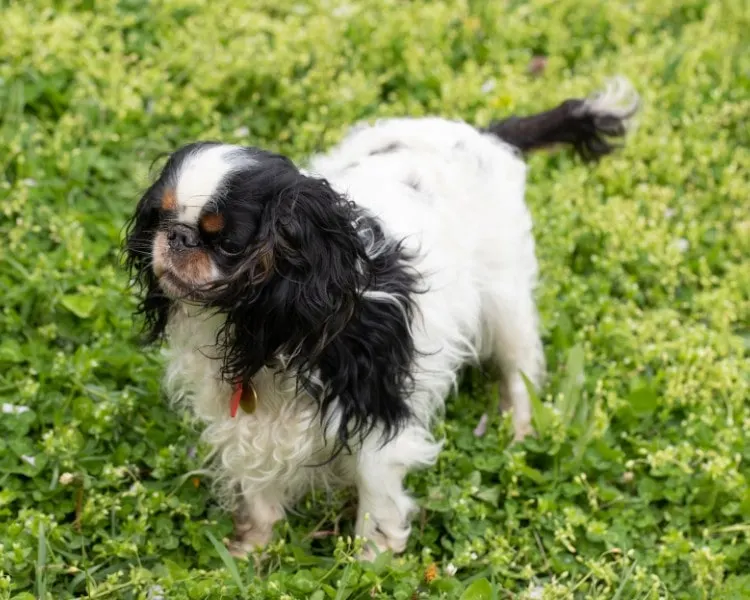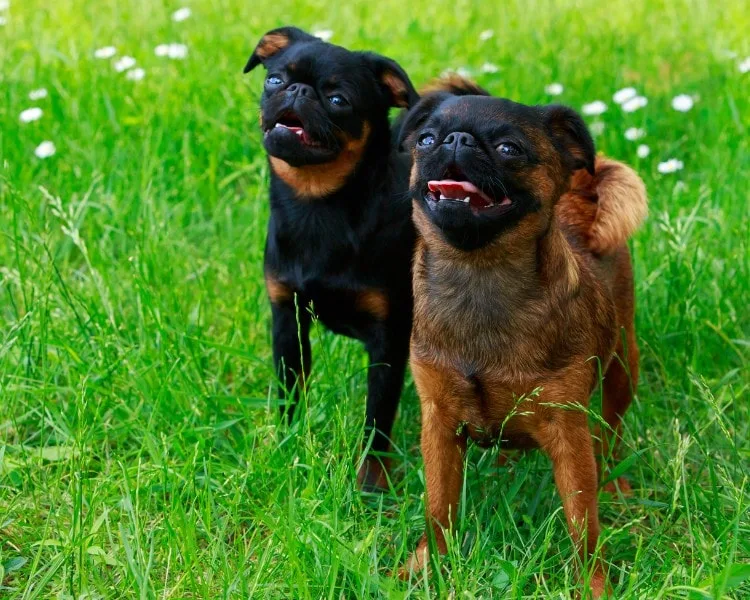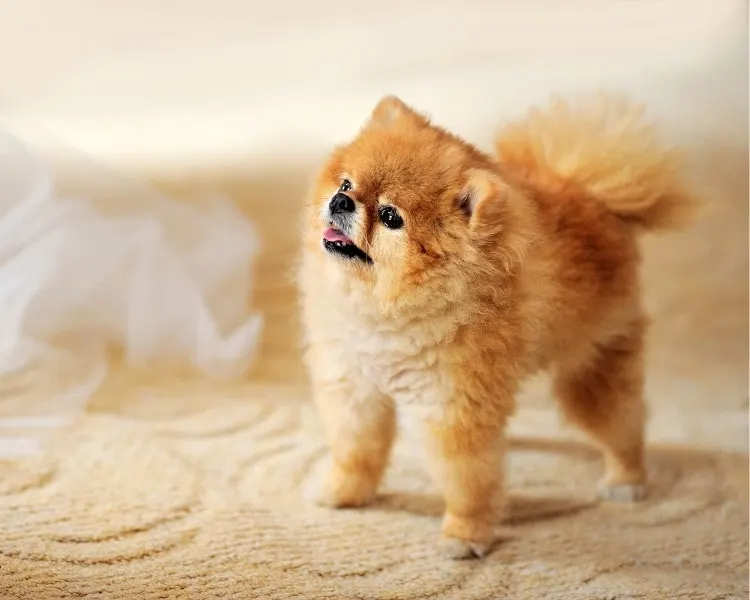Yep, dogs can have underbites too! This article runs through 13 of the most common dog breeds that boast an interesting underbite. Let’s get into it!
What Is an Underbite?
An underbite, medically known as class III malocclusion or prognathism, is a condition where the lower teeth overlap the upper teeth when the mouth is closed.
Essentially, it’s when the lower jaw extends beyond the upper jaw, giving a protruded appearance.
This is a common feature in certain breeds of dogs, as we’ve outlined above, and is often considered a breed characteristic rather than a health concern.
However, a severe underbite can lead to health problems such as difficulty eating and drinking, oral pain, or an increased risk of periodontal disease.
Periodontal disease arises from plaque accumulation on the teeth, which can be more prevalent with an underbite. As a result, regular dental care, such as brushing your dog’s teeth and scheduling professional cleanings, is essential for these breeds.
For more detailed information, you can check out resources like the American Veterinary Dental College website.
Why Would a Dog Get an Underbite?
An underbite in dogs is primarily a genetic feature, inherited from the dog’s parents.
It’s a common characteristic in certain breeds, such as Bulldogs and Pugs.
Breeding dogs with certain facial structures over generations has resulted in these traits becoming common in specific breeds.
Sometimes, an underbite can develop as a result of uneven growth rates between a dog’s upper and lower jaws, often occurring during puppyhood.
In these cases, the condition may become evident as the puppy grows and might not be entirely predictable based on the puppy’s genetic background.
13 Dog Breeds With Underbites!
Let’s run through the most popular 13 breeds of dog that sport a cute underbite. As you’ll see some breeds have a much more obvious underbite than others!
1. Bulldog
The Bulldog, with its distinctive pushed-in nose and undershot jaw, is the poster child for breeds with underbites. The undershot jaw, a common feature of this breed, provides the Bulldog with a rather grumpy yet endearing facial expression. However, this characteristic underbite can sometimes lead to dental problems, making regular vet checks important.

Bulldogs are known for their gentle disposition and adoring nature. They are generally great with kids and have a strong desire to form bonds with their human companions. Despite their somewhat intimidating appearance, Bulldogs are among the most affectionate and dependable breeds you’ll find.
2. Pug
Pugs are small dogs with big personalities and they often sport a noticeable underbite. This underbite can contribute to their unique, expressive faces that pug lovers find irresistibly charming. Similar to Bulldogs, this feature can sometimes cause dental issues so regular dental care and check-ups are necessary.

Despite their small size, Pugs pack a lot of love in their tiny frames. They’re known for their playful and mischievous nature, making them great companions for both children and adults. They’re also surprisingly sturdy and resilient, making them excellent pets for families of all sizes.
3. Boxer
Boxers are medium to large-sized dogs that often have a distinctive underbite. This underbite gives them a unique, strong appearance that’s complemented by their muscular build and short hair. The underbite doesn’t usually cause them major problems, but they can sometimes be prone to gum disease and other dental issues.

As a breed, Boxers are known for their playful and energetic nature. They love to jump and run around, making them great companions for active families. They are also incredibly loyal and protective, making them excellent watchdogs as well.
4. Shih Tzu
The Shih Tzu, a toy breed, often features a charming underbite which contributes to their cute, friendly appearance. They generally have fewer dental problems compared to larger breeds, but they can still benefit from regular dental care.

Shih Tzus are bred to be companion animals, and they excel at this job. They’re known for their friendly and outgoing nature, as well as their long, silky coats. These dogs are small but sturdy, making them a great fit for families and individuals of all ages.
5. Boston Terrier
Boston Terriers are another small breed that often have an underbite. This contributes to their distinctive “tuxedo” appearance, along with their short tail and erect ears. While they’re not as prone to dental problems as some other breeds, it’s still a good idea to keep up with regular dental care.

Boston Terriers are known for their friendly and outgoing nature. They’re also quite intelligent, which makes them quick learners and easy to train. They are well-suited to apartment living and make wonderful companions for individuals and families.
6. Pekingese
The Pekingese is a small, compact dog breed that often showcases an underbite. This feature, along with their thick double coat and lion-like appearance, gives them a distinctive look. Like other breeds with underbites, regular dental care is important to keep them healthy.

Pekingese dogs are known for their confident and dignified demeanor. They’re affectionate with their families and make loyal companions. Despite their small size, they’re known to be quite brave and won’t back down from a challenge.
7. Cavalier King Charles Spaniel
The Cavalier King Charles Spaniel is another breed that often features a slight underbite. This doesn’t usually cause significant health issues, but regular dental care is still important to prevent possible problems down the line.

Cavalier King Charles Spaniels are known for their affectionate and friendly nature. They’re great with kids and other animals, making them a fantastic choice for a family pet. Plus, their small size and adaptability make them suited to a variety of living situations, from apartments to large homes with yards.
8. French Bulldog
French Bulldogs, like their larger Bulldog cousins, often sport a noticeable underbite. This breed’s distinctive bat ears and underbite give them a unique and endearing look. Regular dental care is a must to prevent any potential issues related to this characteristic.

French Bulldogs are known for their playful and friendly demeanor. They are a versatile breed that fits well into a variety of living situations. They’re great with kids and other pets, making them a fantastic choice for a family dog.
9. Maltese
Often associated with elegance and grace, the Maltese breed also frequently presents a slight underbite. While this trait contributes to their overall charming appearance, it also warrants regular dental check-ups to maintain their oral health and avoid any potential issues.

The Maltese is renowned for their glamorous, long, and silky white coat, which requires a fair amount of grooming to keep it looking its best. Despite their small size, Maltese dogs are known to be fearless. They are friendly, responsive, and full of energy. This breed is great for families and individuals alike, always seeking attention and companionship from their owners.
10. English Toy Spaniel
The English Toy Spaniel, similar to the Cavalier King Charles Spaniel, often sports a slight underbite. This feature, along with their long, silky coat, gives them a distinctive look. Regular dental care is essential to keep them healthy.

English Toy Spaniels are known for their gentle and friendly nature. They are relatively quiet dogs that enjoy lounging around and spending time with their families. They do well in a variety of living situations and are particularly suited to those looking for a relaxed, low-energy pet.
11. Affenpinscher
The Affenpinscher is a small dog breed that often has an underbite. This, along with their wiry coat and often comical expressions, give them a distinctive “monkey-like” appearance, which is actually what their name means in German. Regular dental check-ups are important to maintain their oral health.

Affenpinschers are known for their confident and adventurous nature. Despite their small size, they’re quite fearless and won’t hesitate to stand up for themselves. They’re also incredibly loyal and make wonderful companions.
12. Brussels Griffon
The Brussels Griffon is a small breed that often features a clear underbite. This feature contributes to their unique and expressive faces, giving them a distinct appearance. Regular dental care is important to prevent any potential health issues related to their underbite.

Brussels Griffons are known for their alert and sensitive nature. They are great companions and thrive when they are part of the family activities. Despite their small size, they have a lot of personality packed into their tiny frames. They can be a bit stubborn at times, but their lovable nature makes them a great pet for many.
13. Pomeranian
Last but certainly not least, the Pomeranian breed is also known to frequently exhibit an underbite, while only slight and not always noticeable. While this trait often adds to their overall charismatic and spirited expression, it’s important for owners to ensure regular dental care for their Pomeranian to maintain their oral health.

Pomeranians are a small breed known for their abundant, fluffy coats and lively personalities. Their fox-like faces and plume-like tails are distinctive features that often charm dog lovers. Despite their small size, Pomeranians are known for their bold and courageous personalities. They’re energetic, intelligent, and curious about the world around them.
What Problems Can Underbites Cause?
Underbites in dogs can range from mild to severe. The potential problems they might cause depend largely on the degree of the underbite.
- Mild Underbites: These often present no significant health problems for the dog. Dogs with a mild underbite can eat, drink, and play normally without experiencing any discomfort or pain. In these cases, the underbite is generally considered more of a cosmetic issue rather than a health concern.
- Severe Underbites: Severe underbites can lead to a range of complications. These dogs may have:
- Difficulty Eating: The improper alignment can interfere with their ability to pick up food or chew properly.
- Dental Problems: Over time, uneven wear and tear can lead to tooth decay and periodontal disease.
- Injury to the Mouth: The lower teeth might injure the upper gums or palate, causing discomfort or pain.
Additionally, certain breeds with underbites can be predisposed to brachycephalic syndrome due to their unique head shape. This condition can lead to difficulties with breathing and overheating.
Regular dental check-ups are crucial to identify and manage any potential problems early on.
If you notice any signs of discomfort, trouble eating, or changes in your dog’s behavior, it’s always recommended to consult a vet.
Can Underbites Be Fixed?
Fortunately, in most cases underbites in dogs can often be managed or corrected, especially if addressed early.
The approach to fixing an underbite largely depends on the severity of the condition and any associated symptoms.
- For puppies: If an underbite is detected early in a puppy, it’s sometimes possible to correct it as the puppy grows. In certain cases, a special diet or specific chew toys might be recommended to help promote appropriate jaw growth and alignment.
- For adult dogs: In adult dogs, the options for correcting an underbite are more limited because their jaw bones have fully developed. For adults with mild underbites and no associated health problems, veterinarians typically do not recommend treatment as the underbite is more of a cosmetic issue.
- Severe underbites: If an underbite is causing significant health problems, such as difficulty eating or oral pain, surgical intervention may be considered. Orthodontic appliances can sometimes be used to help reposition the teeth and alleviate symptoms. However, these treatments can be expensive and require a significant time commitment from the owner.
It’s essential to consult with a veterinary professional or a veterinary dentist if you’re considering treatment options for your dog’s underbite.
